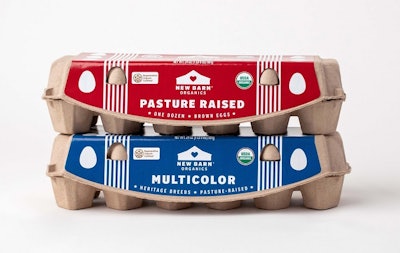
Regenerative agriculture is a movement driven by producers and corporations that gives them the opportunity to decide how they will incorporate sustainable farming practices into their existing process. Earlier this year, NestFresh, a company that produces shell eggs and egg products, collaborated with New Barn Organics, a company that primarily produces milk products, to produce Regenerative Organic Certified (ROC) shell eggs. The two types of eggs offered under the certification include pasture raised and multicolored and can be purchased at multiple locations throughout the U.S.
Established in 2017, ROC is a certification program established by the Regenerative Organic Alliance (ROA). Standards are set for farming, ranching, soil health, animal welfare, and farmer and worker fairness. It is the only existing national standard for regenerative organic agriculture and is based off the USDA Organic standards.
According to ROC’s website, the goal of the certification is to increase soil organic matter over time and sequesters carbon below and above ground, improve animal welfare and provide economic stability and fairness for farmers, ranchers, and workers.
"We believe regenerative organic agriculture has the potential to address many of today's pressing problems, including the climate crisis, factory farming, and fractured rural economies," said Elizabeth Whitlow, the ROA's Executive Director. "Building healthy soil and increasing organic matter is proven to sequester more carbon and make farms more resilient to flood and drought.”
How to become certified
For a company to be eligible for the ROC certification, its products must comply to the program's three pillars: Soil Health & Land Management, Animal Welfare, and Farmer & Worker Fairness. ROC has three levels: Bronze, Silver, and Gold. As the levels increase, a larger percentage of regenerative farming is required.
Additionally, according to the Framework for Regenerative Organic Certified, a farm must first be USDA organic certificated, or an international equivalent formally recognized by the National Organic Program (NOP). ROC is built from the NOP and other comparable standards. The certification covers requirements from the farm level through processing and allows all sizes of operations to apply. Then, a farm will be measured against the Framework in all applicable parts of its process flow.
Ted Robb, cofounder of New Barn Organics, stated in a press release, "What really excited our team was their genuine desire to support our deeper mission and purpose, which starts with the belief that regenerative organic agriculture is essential to creating a healthier food system for future generations. We couldn't be more excited to be their partners in launching the first nationally distributed Regenerative Organic Certified (ROC™) eggs."


















